
 |
omg this thread is making me hungry XD
|
Otoro - Fatty Tuna
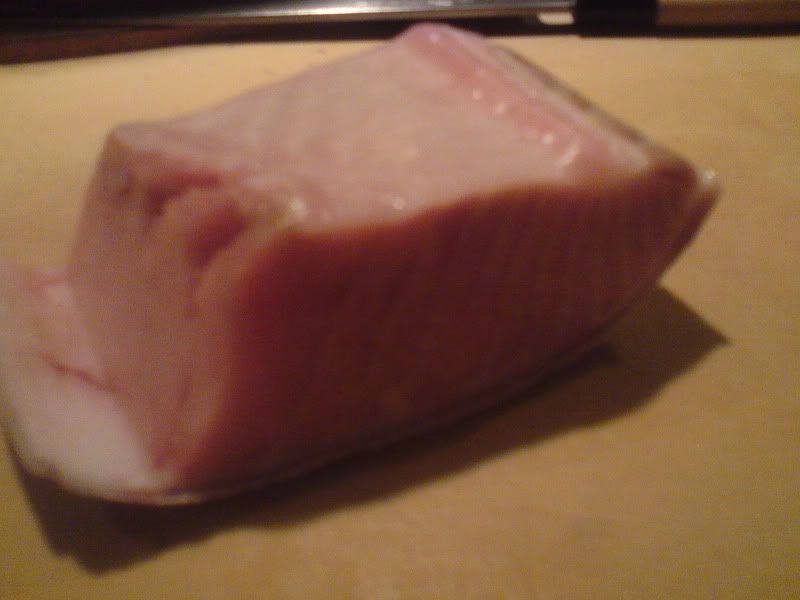 First off, I would like too start by apologising for the EXTREMELY poor quality picture. It is one of the few I snapped, the best of that few, and for some reason my camera had a mind of it's own for the shots. Otoro has a property more like beef than any other fish I have encountered. Like beef, Otoro CAN be TOO fresh. Fresh beef, right after the cattle is killed, is extremely tough and relatively flavourless. This is called Green Meat. Most beef that the typical consumer purchases at the local mart has been 'aged'. Yes, that's right 'aged'. The reason for this is because immediately after death, the cattle goes through rigor-mortis. A process in which some chemicals go all wonkers and causes the meat to toughen up. After a few days to a week, the meat begins to rot, or break down. This is desirable. This process also applies too Otoro. Otoro is (from personal experience) sometimes frozen just before exporting while the meat is still really fresh. The only reason why I brought this up is so that you guys might know WHY your apparently really fresh Otoro doesn't taste as succulent and scrumptious as your tab says it should (Just a note, the pictured block of Otoro has a value of about $60 USD). In regards too the taste of Otoro, it's sweet and buttery. When aged (too perfection) it literally melts in your mouth and provides an indulgence some dietarily concerned consumers might feel guilty of. However, some people might find this overwhelming sensation of buttery goodness a little overbearing and opt for Chutoro, a less fatty version (closer too the loin) of Otoro. For a good fusion suggestion, have your Itamae-san lightly sear just the upper portion of the Otoro and finish off with a pinch of hon-wasabi (real wasabi). For a more traditional touch, leave out the searing. Here is a BETTER quality shot of the Otoro. 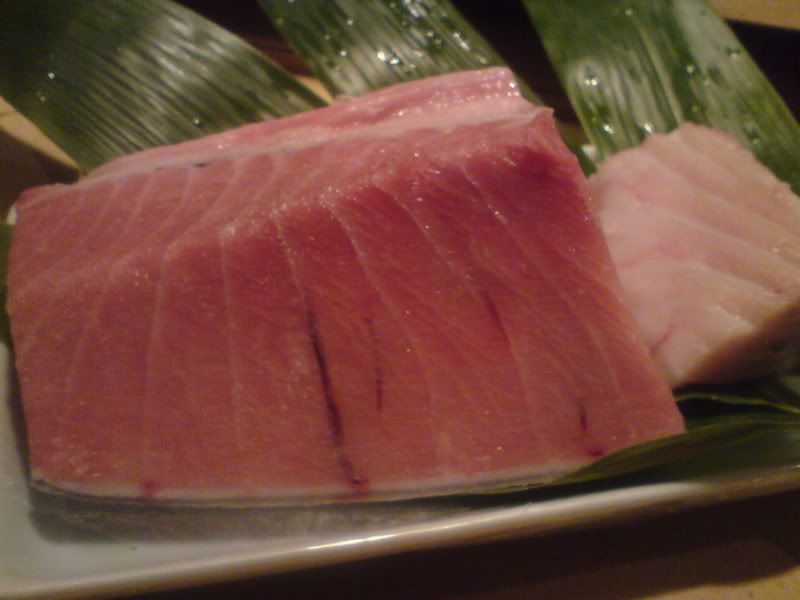 Probably price it near $100 for this particular block. |
Quote:
aaaah, YUP! It was when I realized how much I noticed the difference between hamachi cuts that I confessed that I am beginning to turn into a bit of a sushi-snob. もっと喜ばしなさいか。 |
I have a question for yuujirou. Where do all the fish that are served in your restaurant come from? Thanks in advance.
|
Quote:
Sake is farm raised Atlantic Salmon, idk where that's from Unagi is probably from Taiwan (almost ALL unagi outside of Japan comes from like 3 distributors....) Uni is from somewhere near San Diego Live Scallops, Razor Clams, Aoyagi (Giant Surf Clam), and I think Odoroi no Amaebi are from Boston Aji, Ayu, Kohada and Tori-Gai are all from Japan Beni Sake (Sockeye/red Salmon) is from Oregon Tai is from New Zealand; Sometimes we get madai, but not often Maguro is from Big-Eye Tuna... not sure where it's caught though Otoro and sometimes Chutoro is from Blue Fin Kampachi or Amberjack is from Hawaii Vegetables such as Daikon, Nihon Kyuuri, and sometimes Negi are from Japanese Farmers in California i think Things such as Shime-Saba, Tamago and Anago are all made on spot and in small batches. Seaweed is from Japan (Yamashou no Nori) and everything else is just from typical distributers things such as Tako, Ika, Hamachi, Shiro-Maguro, Ebi Hope that answers your question... *Note, I don't really want to post off topic posts like this one in this thread... but I suppose Nagoyankee's question is somewhat related too the purpose of this thread, so just this once, lol* **All items that I bolded, we do not get them very often... or atleast we either get them on and off (don't carry them consistently) or only when they're in season** |
Thanks a lot, yuujirou! That was such a detailed response! Keep on nigiri-ing, man!
|
Quote:
|
Sake
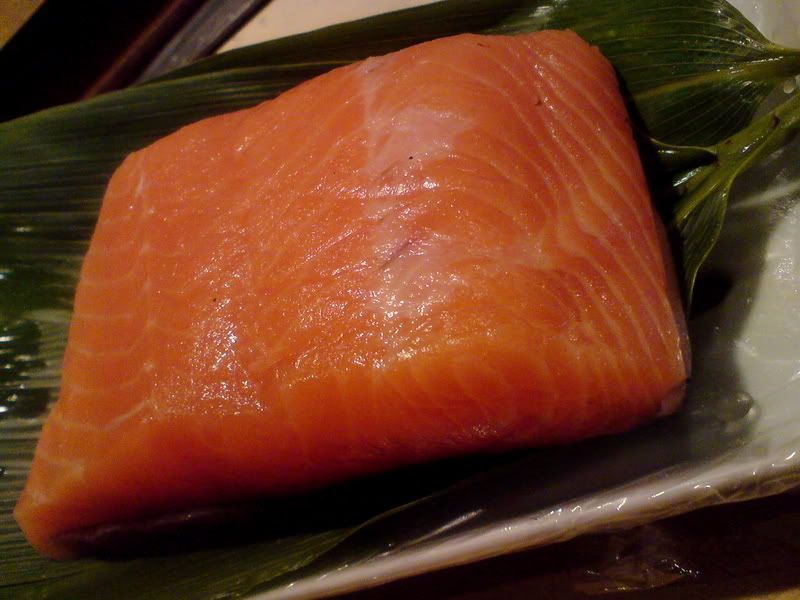 Really not much too say on this piece as Salmon is probably the most recognisable fish in America when it comes too sushi. However, I suppose it would be worth noting that Salmon is not a traditional ingredient in sushi nor is it traditionally served raw/fresh. Also, something that many of you might not know that the belly of the salmon contains a higher percent of fat in it. This cut is called Sake-Toro and has a bit more flavour than the rest of the body. Although this is something that's applicable too most or all larger fish; The cheeks and the collar or kama are the most tender; the stomach is fattier thus more flavourful; the back or the loin is more lean, thus more meatier; the tail is where all the tendons conjoin, thus the meat from the tail are usually scrapped off with a spoon, resulting in a mushy and rather unappetising mass of by-product. Most American sushi cooks don't know about this part of the salmon as they usually discard most of the belly portion during the pre-prep of the salmon. Lazy bastards too lazy to maneuver their knife around the bones, just cut straight through it and off the entire piece. |
Mirugai
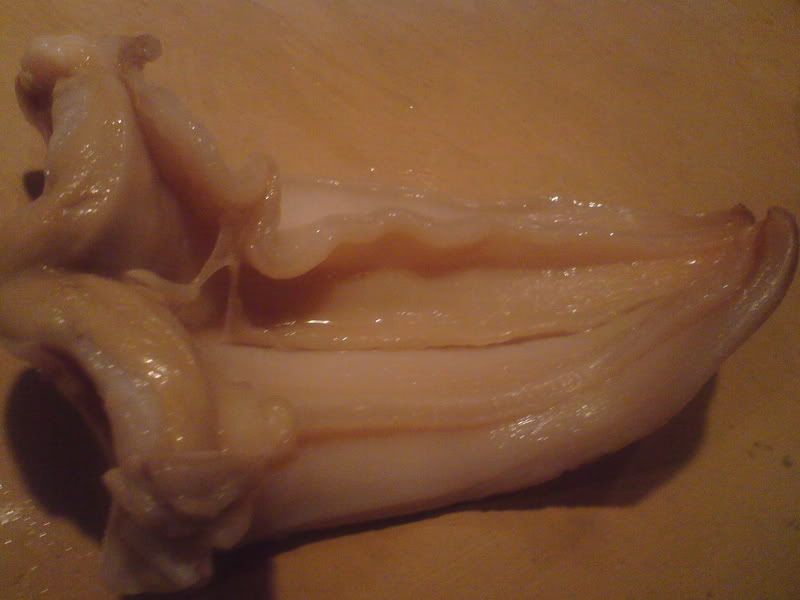 Geoduck, Giant Clam, Mirugai, that clam with the extremely long protruding trunk that resembles something of an elephant's trunk, whatever name or description you know it by, this is what it looks like after you've opened the shell, separated the trunk from the rest of the body, boiled it, iced it, peeled it, sliced it in half, and then salted and rubbed it. Mirugai has a crunchy texture and a slightly sweet and clammy taste to it. When the meat is still alive, it is a more firm and I personally believe it tastes better. When it is dead, the meat is limp and somewhat slimy. |
Suzuki
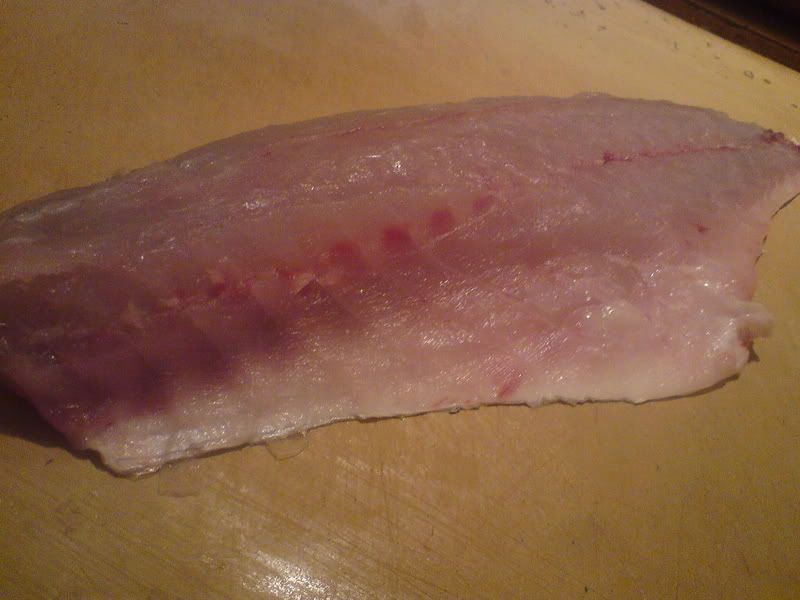 Ah, Suzuki, or Sea Bass in English. This white meat fish is typically bought farm-raised. I personally have never had the grande fortune of tasting wild Suzuki, but as far as the farm raised variety goes, it's quite nasty. Many cooks have described it as having a muddy taste; to which I personally do agree with. As compared to the other two typical white meats, hirame and tai, suzuki has a firmer texture, and it's blood line is a more brilliant red as compared to the more opaque and translucent tai. I really don't like the way this fish tastes. Although, I must say that due to it's brilliant colour, it makes for a very attractive garnish when cut usuzukuri style then rolled into a flower. |
| All times are GMT. The time now is 08:57 AM. |